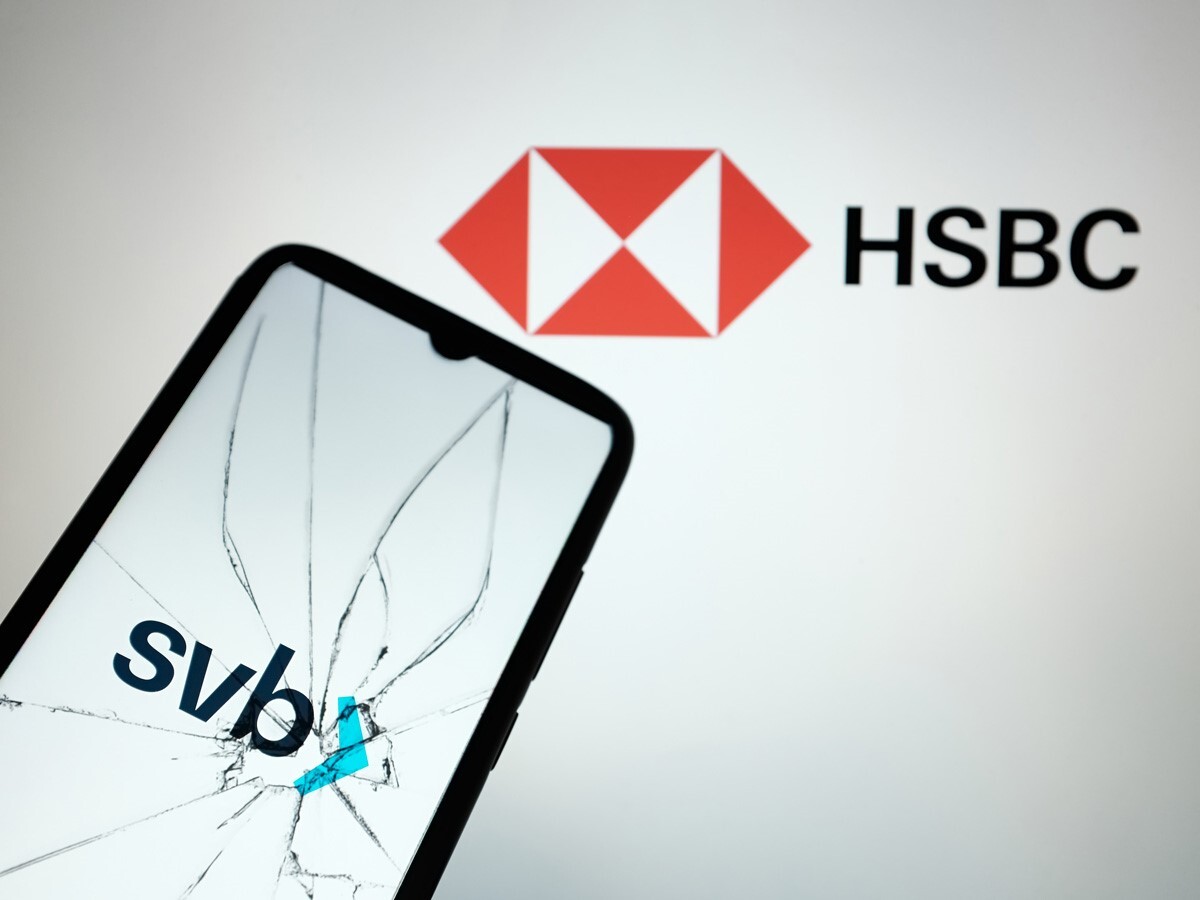Silicon Valley Bank (SVB) was shut down by US regulators on 10 March in the second-largest bank failure in US history. Many start-ups, particularly in tech and life sciences, relied on it for funding, and the collapse spurred panic across international markets. The bank’s UK arm was set to be declared insolvent by the Bank of England (BoE), but then another bank in shining armour stepped into its rescue.
- HSBC acquired SVB UK for a symbolic £1 on 13 March, with plans to invest £2.9bn to keep it operational.
-HSBC’s share price has fallen nearly 8% since the announcement, as of 15 March.
- “The wider UK banking system remains safe, sound, and well capitalised,” the Bank of England said following the deal.
The £1 bailout
British bank HSBC [HSBA] saved the UK’s tech sector from a potential disaster by bailing out SVB’s UK arm in a fire sale for a symbolic £1 in a deal announced on 13 March. Prime Minister Rishi Sunak led the overnight talks while the BoE acted as guarantor.
HSBC’s share price fell 4.5% on 13 March after the deal was made, along with other European bank stocks. Its shares have dropped 7.9% since the announcement, as of 15 March.
The US-based SVB’s [SIVB] meltdown spurred widespread fears about the impact on the broader banking system and the tech companies that depended on it for capital.
Global financial equities tumbled by $465bn in market value within two days of the SVB collapse as investors scrambled to limit their exposure to lending institutions globally, Bloomberg reported.
A possible shutdown of SVB UK, which supports around 3,300 UK clients ranging from start-ups, venture-backed companies, and funds, would have endangered the UK’s tech and life science sectors.
SVB UK had about £5.5bn in loans and approximately £6.7bn in deposits as of 10 March, when the BoE deemed it on the verge of insolvency after its US parent failed. The bank had over £10bn in deposits on 9 March, and depositors had already taken out billions of pounds as UK tech executives began to panic, a source familiar with the matter told Bloomberg.
A win-win deal
HSBC believes it grabbed a good deal. CEO Noel Quinn said the purchase made “excellent strategic sense” as it avoids the UK government having to intervene to protect depositors and aligns with HSBC’s own business ambitions.
HSBC will reportedly invest $2.1bn to sustain the business and expects to profit from the deal. It sees inheriting SVB UK’s 3,300 clients as an asset aligning with its pre-existing expansion plans.
Despite the significant outflows from SVB UK last week, HSBC has acquired a company without solvency concerns. The bank has about £1.4bn in tangible equity, comprising a £1bn injection from its former parent company in 2022 and the rest from AT1 and tier 2 capital bonds.
The BoE said on 13 March the deal ensured “the continuity of banking services, minimising disruption to the UK technology sector and supporting confidence in the financial system”.
HSBC, however, was not SVB UK’s only suitor. While it snapped up the bargain in time, several others were also mulling bailout deals. An investment firm owned by a UAE royal, Royal Group, was considering an offer, sources familiar with the matter told Bloomberg, and UK government-owned Bank of London Group had submitted an official proposal to the Treasury, BoE and SVB UK’s board.
UK impact
On 11 March, almost 180 UK tech company leaders sent a letter asking UK Chancellor Jeremy Hunt to step in. “The loss of deposits has the potential to cripple the sector and set the ecosystem back 20 years,” they expressed in the letter seen by Bloomberg. “Many businesses will be sent into involuntary liquidation overnight.”
While the immediate danger to the UK’s tech start-ups has been averted with the HSBC takeover, what does it mean for Europe’s banks?
Deutsche Bank and Citigroup analysts said the SVB failure does not translate to European lenders, which are still attractive to investors as interest rates hike. The analysts rely on more varied sources of liquid financing, have the capacity to win and keep deposits and have sturdier financial reserves than the US lender.
“We think this is another test (and hopefully ultimately proof) that the European banks are much more resilient and not the weak link in the financial system this time,” Deutsche Bank said.
Despite its importance for some customers, the BoE said SVB had a limited presence in the UK and did not carry out any critical functions. It stressed in a statement on 13 March: “No other UK banks are directly materially affected by these actions, or by the resolution of SVB UK’s US parent bank. The wider UK banking system remains safe, sound, and well capitalised.”
Continue reading for FREE
- Includes free newsletter updates, unsubscribe anytime. Privacy policy





